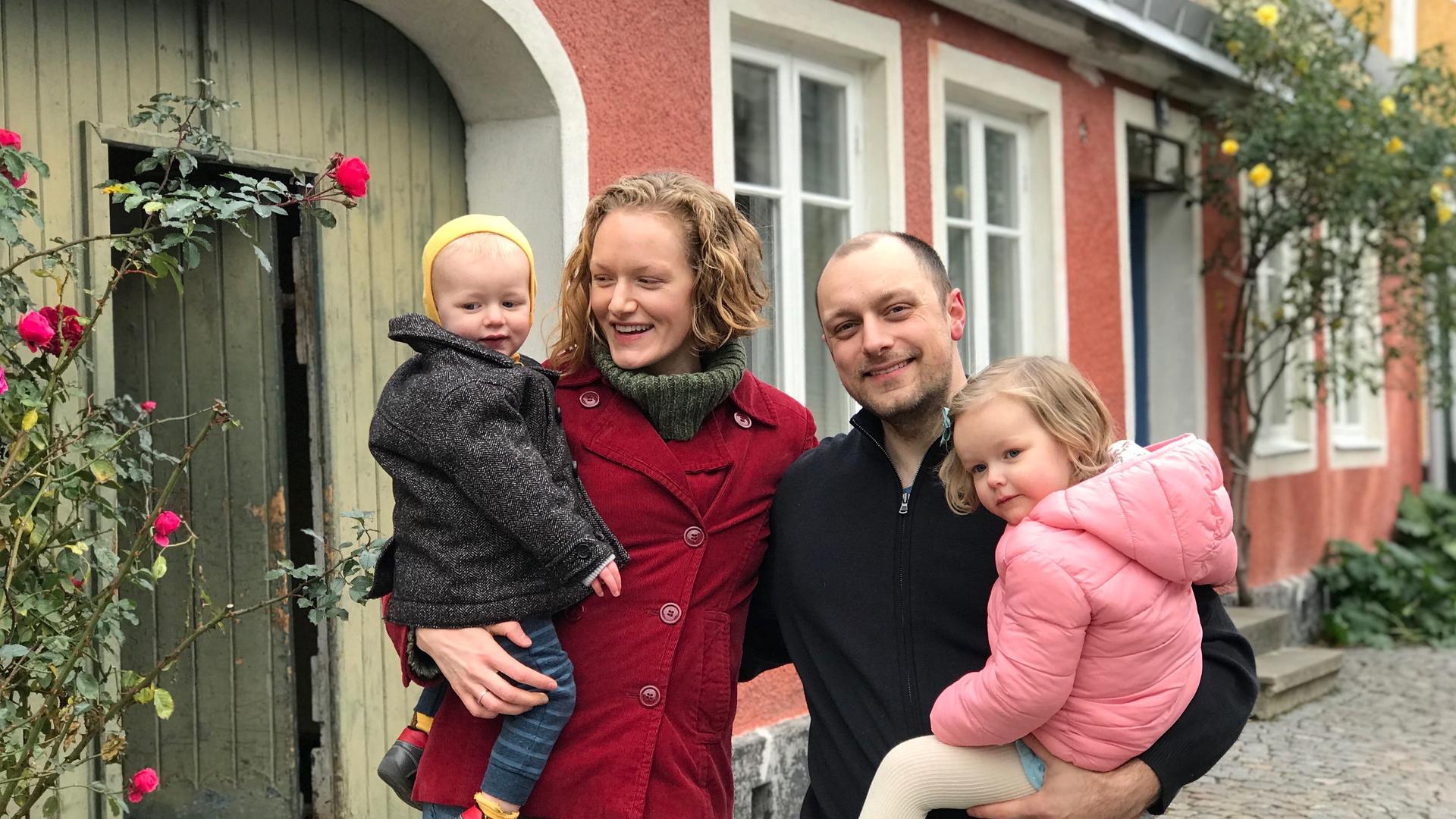Eva Panarese, from Italy’s Tuscany, used to dream about moving to Sweden. Her mother, who is Swedish, would recount stories about her home country when she was little.
Panarese thought it sounded like the perfect place to settle and raise a family. Two years ago, she made it happen, moving with her husband, Ilario Ripoli, and their two children, to Lund, a university city in the south of the country. Their home is pretty idyllic, she says.
Related: ‘Travel bubbles’: Who’s in and who’s out of the plan to save global tourism
“It’s a beautiful natural area. We have the beach five minutes away. A lake just across the road. So, it’s really a paradise.”
“It’s a beautiful natural area. We have the beach five minutes away. A lake just across the road. So, it’s really a paradise.”
But in late February, things changed. By then, countries across Europe were grappling with the novel coronavirus, closing their borders and heading into lockdown. But in Sweden, little changed. That lax response to the pandemic has led some foreigners, including Panarese, to rethink life in Sweden — some have even chosen to relocate.
Panarese came back from a medical conference in Italy in February, and shortly afterward, her husband, who suffers from respiratory disease, and their son both became ill. At this stage, Italy, which would end up having one of the highest death rates in the world from the coronavirus, was only starting to wake up to the impact of the disease.
Related: In Spain after lockdown, soccer resumes for men — but not for women
Panarese worried she might have contracted the virus during her trip and passed it on to her family. As her son’s condition improved, Ripoli got worse, and he was taken to hospital. It was here that Panarese became truly alarmed. No one in the hospital was wearing a mask, she says, and nobody offered them a test for COVID-19.
“They didn’t know what to do. They didn’t know how to help us. They did not want to do the test — not on me because I was asymptomatic, which I can understand — but not even on my husband.”
The Swedish government appealed to its citizens to maintain social distancing and to stay home if they were sick. Gatherings of over 50 people were banned, and companies arranged for staff to begin working from home. But unlike the rest of Europe, Swedish shops, restaurants, gyms and schools remained open.
For Panarese, it created a dilemma. Under Swedish law, children are obliged to go to school, and keeping them home can lead to intervention by child protection services. But Panarese’s own children were terrified they would contract the virus at school and infect their father.
“They were feeling a little bit like, ‘Oh my gosh, if I go to school and then I come back, I can kill my father.’”
“They were feeling a little bit like, ‘Oh my gosh, if I go to school and then I come back, I can kill my father.’”
Panarese defied the law and kept her children, who are 12 and 15, at home. But the experience has changed how she views the country. And she’s not alone.
Related: Table for One in Sweden is an ode to solo dining
Keith Begg from Limerick, Ireland, moved to Stockholm for love seven years ago. As the virus spread, Begg heard from family members back home about the strict lockdown Ireland was undertaking. Irish friends told him they felt a moral obligation to shut down the country in order to protect their elderly and more vulnerable people.

Begg says the sense of national unity he was hearing about in his native country seemed absent in his adopted city, where the attitude was practically “hedonistic.”
“There were packed bars, packed restaurants and cafes. The attitude here was just simply, ‘Sure, we might as well go out because we’re going to get the virus anyway.’”
“There were packed bars, packed restaurants and cafes. The attitude here was just simply, ‘Sure, we might as well go out because we’re going to get the virus anyway.’”
Begg’s concern was initially very much in the minority. Support for the Swedish government’s approach in March was high. Frustrated, Begg set up a focus group of medical experts, teachers, parents and human rights activists to counteract the government’s stance. But his actions have come at a cost: Friends on Facebook sent him hate messages, while former colleagues blocked him. Begg says he has lost nearly all of his Swedish friends, some he has known for over 20 years.
Related: Swedish town uses chicken manure to disperse crowds — and stop spread of coronavirus
“They think I’m crazy. So many of us expats have been seen as hysterical. We’ve had every expletive thrown at us.”
Begg believes the Swedish government’s strategy is driven primarily by economics, and the result, he says, is a society which is both “morally and ethically bankrupt.”
He has been socially isolating with his husband, Cristian Pettersson, who’s Swedish, since March.
Allyson Plumberg, who’s originally from Minneapolis, and her family have also been sheltering in place in Lund. They moved there two years ago when her husband, a physicist, was offered a job at the local university. At first, Plumberg says she loved the simplicity of life in Sweden with its strong emphasis on family-friendly policies. But she says the pandemic has shown her a different side of Swedish society.
Like Panarese, some of Plumberg’s friends have come into conflict with the education authorities for wanting to keep their children out of school for fear they will infect an at-risk relative.
“It’s really ironic that Sweden, which has this philosophy of equality for all, is being so deeply undermined for families right now during the pandemic.”
“It’s really ironic that Sweden, which has this philosophy of equality for all, is being so deeply undermined for families right now during the pandemic.”
When Plumberg and her two small children go to the local grocery store, they are often met with stares, she says. They are the only customers wearing face masks. Plumberg makes them herself as she cannot find any on sale locally.
While support for the government’s approach had been markedly high, new opinion polls show attitudes are changing as the death rate has climbed. Sweden currently has one of the highest death rates per capita in the world, and recent polls show public support at less than 50%.
Chief epidemiologist Anders Tegnell, who is credited with driving Sweden’s strategy, said in an interview with SR, the Swedish state broadcaster, that too many people had died. But he did not apologize for the government’s tactics. Nearly half of those deaths have occurred in Swedish care homes.
Anna Douglas, who is from Scotland and supports the Swedish approach, believes that long-standing problems in nursing homes contributed to those deaths. She says the way the homes are run, and in particular, how they employ staff are key issues, with many workers on zero-hours contracts — meaning they have no guarantee of work.
“You have a high exchange of people. You have people who are unwilling to be off sick if they are not feeling a hundred percent, and therefore, they come to work and potentially can spread this disease.”
Douglas says her family back in Scotland was worried when they saw Sweden defying the lockdown trend. She worried, too, but she believes the government is taking a more sustainable approach and looking at how to live with a pandemic in the longer term. The Swedish strategy empowers people to take responsibility for themselves and others, she says.
“I think mostly it’s treating people as adults. Giving people the responsibility to take judgments and decisions themselves. This isn’t something that the government can fix for us; it’s something that we all have to do together.“
“I think mostly it’s treating people as adults. Giving people the responsibility to take judgments and decisions themselves. This isn’t something that the government can fix for us; it’s something that we all have to do together.“
Laura Servant, who is originally from Paris, agrees. She moved to Stockholm less than a year ago with her husband and two young children. She was relieved to be in Sweden and not France when the virus spread through Europe. Paris imposed one of the toughest lockdowns worldwide, and Servant says the stress of being stuck indoors for so long has had a severe impact on people’s mental health that is not being sufficiently acknowledged. She says she appreciates the freedom she has.

“I am feeling very blessed and very lucky to have this freedom. If I want to go to the park, I can go to the park without fearing policemen arresting me and asking me why I’m here.”
But Servant does not want to see visitors from other parts of Europe coming to experience those freedoms. She says people in Sweden are being generally cautious, adding that she’s still unable to visit her family back home.
“No, I don’t think it’s fair for them to think they can come here and do tourism, because I won’t be able to visit my family in a long time.”
Plumberg will be seeing her family sooner than expected. She is planning on moving back to the US this summer. Plumberg says although her husband’s contract in Sweden is coming to an end, that’s not the only reason they’re leaving: The Swedish attitude to the pandemic changed how they viewed the Nordic country and their future life there.
Begg has also begun applying for jobs back in Ireland. He says despite having Swedish citizenship, he can no longer imagine living in Stockholm long term.
For Panarese, it’s an emotional and financial struggle. Her family bought a house for the first time in their lives, she says, and leaving now will lead to a considerable economic headache. But Panarese admits she is looking across the border to neighboring Denmark and seriously contemplating moving there. Sweden was the country she thought she would grow old and die in, she says, but now that no longer seems possible.
